Celebrating Excellence and Innovation: Highlights from the 2025 AACP Annual Conference
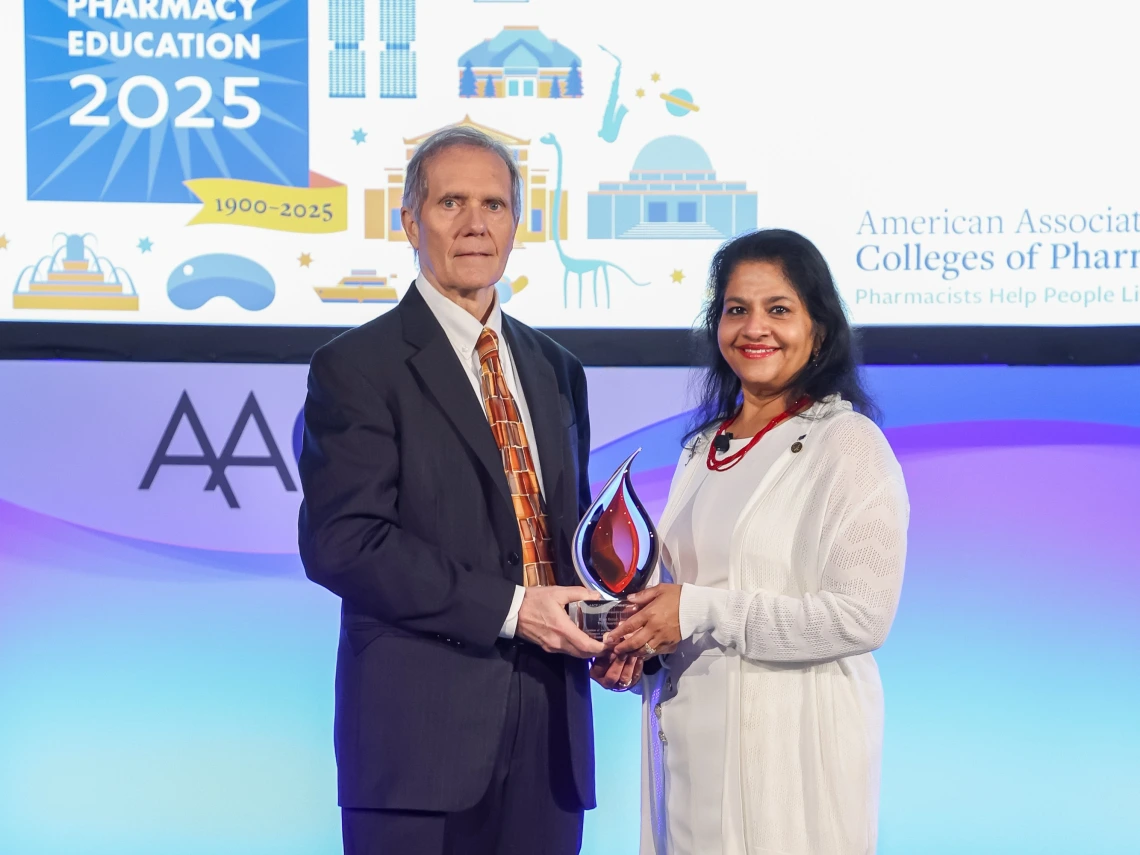
photo credit: American Association of Colleges of Pharmacy
Each year, faculty and staff travel to the American Association of Colleges of Pharmacy (AACP) Annual Conference to stay current with industry trends and support their professional development, ultimately benefiting both the college and its students. AACP is the national organization representing pharmacy education in the United States. Its membership includes 142 accredited schools of pharmacy, as recognized by the Accreditation Council for Pharmacy Education, and individual members such as administrators, faculty, and staff. In total, AACP represents more than 6,400 faculty members, 62,500 students enrolled in professional programs, and 5,100 graduate students nationally.
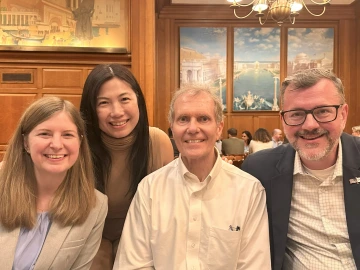
Dr. Brian Erstad sits with Michael Hogue, the CEO and EVP of the American Pharmacists Association, Anita Siu, and Angela Bingham, Board Members of the Board of Pharmacy Specialties.
This year’s conference was particularly significant, as Brian Erstad, PharmD, interim dean, received the prestigious AACP Lifetime Achievement Award. This award honors individuals who have made a meaningful and sustained impact on the organization and pharmacy education through instruction, leadership, service, research, and scholarship over a period of at least 25 years.
The award was made even more special by the presence of colleagues who joined in the celebration. “I was so grateful that several college staff as well as faculty were able to attend the meeting,” shared Erstad. “It was so nice to see all of the smiling faces at our dinner celebration.”
In addition to this major recognition, several faculty members actively contributed to the conference by leading sessions and sharing research. The AACP Annual Conference provides attendees with dynamic programming, opportunities for networking, skill development, and a forum to address the most pressing issues in pharmacy education and the broader healthcare landscape.
Faculty Contributions and Engagement
Beyond attending, many faculty members played active roles throughout the conference. Erstad and Nancy Alvarez, PharmD, associate dean and professor, served as roundtable facilitators for a session titled “Best Practice Strategies for Nominating Faculty for Honors and Awards.” Their research, which inspired this session, was later published on ScienceDirect. Recognizing sponsoring nominations for awards is a meaningful way for pharmacists and pharmacy personnel to recognize excellence within the profession. Erstad and Alvarez offered practical guidance on how thoughtful preparation, strategic framing, and compelling storytelling can strengthen a nomination and enhance its chances for success.
“Moderating this roundtable was a fun and rewarding experience. It was valuable to hear how others are supporting their teams by nominating them for honors/awards and to share insights based on our experiences. Whether they were completely new to the nomination process or already doing it consistently, we enjoyed a lively exchange of thoughts," shared Alvarez. "Being able to both learn from others and offer encouragement was a truly meaningful way to spend a few hours.”
Ashley Campbell, PharmD, associate clinical professor, led the Geriatrics SIG Networking Event as a faculty delegate, while Janet Cooley, PharmD, experiential education director, and Bernadette Cornelison, PharmD, associate clinical professor, both delivered impactful presentations.
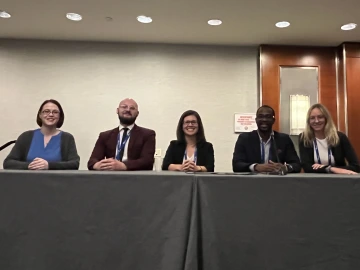
Dr. Bernadette Cornelison (center)
Janet Cooley, PharmD, director of experiential education, and Bernadette Cornelison, PharmD, associate clinical professor, also made significant contributions through their presentations and research.
Cornelison presented three research posters at the conference, focusing on innovative teaching strategies and inclusivity. Her work explored topics such as learning through patient videos in self-care therapeutics, the application of chatbots to support medication safety during pregnancy, and faculty perspectives on diversity, equity, and inclusion at the College of Pharmacy. She also participated in the Grant Microsessions program with a presentation focused on the scholarship of teaching and learning.
Cooley presented two sessions: “Bridging the Gap: An Evidence-Based Preceptor Development Program to Support Pharmacy Learner Professional Identity Formation” and “Write On! Overcoming Barriers to Scholarly Success.” These presentations emphasized the importance of evidence-based faculty development and building a culture of scholarly support.
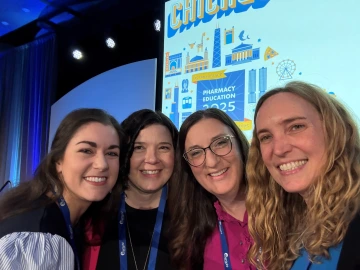
Dr. Janet Cooley (right)
Beyond presenting, the conference served as a space for building new collaborations and envisioning future improvements for students and faculty alike. “I am working to see how we might be able to work with our state board and NABP to improve things for our students, helping build connections between colleagues to create opportunities for students, and improve the inclusivity in our teaching,” says Cooley.
As pharmacy education continues to evolve, the AACP Annual Conference remains a vital platform for collaboration, recognition, and growth. The strong presence and active engagement of faculty this year underscore the College of Pharmacy’s commitment to innovation and excellence in the field.
Let's Hear From the Attendees
Nancy Alvarez, PharmD | Professor of Practice
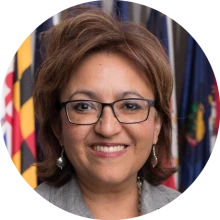
Nancy Alvarez, PharmD, served on the AzPA Board of Directors before graduating from RKCCOP in 1992. She was a founding leader of the Chapman University School of Pharmacy, and before academia her career experiences included community pharmacy practice, end of life care, and medical communications at for a pharmaceutical company developing pain relieving products. Nancy is a former president of the American Pharmacists Association (APhA) and Phi Lambda Sigma Leadership Society. She serves on the boards for the Society for Pain and Palliative Care Pharmacists Foundation, the APhA Foundation, the American Institute for the History of Pharmacy, the Pharmacy Leadership and Education Institute, and the AzPA Board of Directors, as a liaison from RKCCOP. She is editor/co-author for Bypass Pharmacy Burnout: Changing Your Trajectory to Enhance Your Experience and a Certified Professional Co-Active Coach. She is an APhA fellow and the recipient of the Phi Delta Chi Nancy A. Alvarez Professional and Service Projects Award, APhA Gloria Niemeyer Franke Leadership Mentor Award, and the Linwood F. Tice Friend of APhA-Academy of Student Pharmacists. She was the 2022 Honorary Alumna of the University of Iowa College of Pharmacy. Recognition from the AzPA includes the Distinguished Young Pharmacist of the Year and the Employee Pharmacist of the Year.
Why did you attend the conference, and what were you looking to learn/contribute?
- The main reasons for attending AACP is to hear about the status of the academy – both challenges and reasons for hope and optimism. I appreciate hearing the perspectives of other assistant/associate/CEO Deans and learning from them.
I co-facilitated a round-table discussion about the importance of and considerations for nominating people for awards with Brian Erstad. I have a growing interest in the history of pharmacy and met with a small cohort of people who have deep interest.
If you could bring one idea or initiative from the conference back to the College of Pharmacy, what would it be?
- I brought a sentiment from a session “From Crisis to Controversy: Shifting Social and Cultural Narrative in Pharmacy Education” that has broader application and that is that “We have never made progress without regression first”. I found inspiration and hopefulness in the speakers’ statement.
Which speaker or session had the biggest impact on you and why?
- The keynote speaker was exceptional as he spoke about the multifaceted issues facing academia, funding, research and discussed the distinctive role of the pharmacist to communicate to the public and advocate for patients. He was engaging and compelling.
Did you network with any professionals? If so, what advice did they share with you or did you share with them?
- Countless as I enjoy a rich community of colleagues and place to belong – which is a benefit of attending the meeting. I used coaching skills to listen well and help others facing challenges consider what they wanted and steps they could take. Additionally, celebrating Brian Erstad was joyous. Joined by the CEO of the American Pharmacists Association and colleagues who serve with Brian on the Board of Pharmacy Specialties, faculty and staff and attendance walked to a local restaurant and enjoyed a meal and visiting with one another in celebration of the life-long contributions of a long-time leader in our College.
Ashley Campbell, PharmD | Associate Clinical Professor
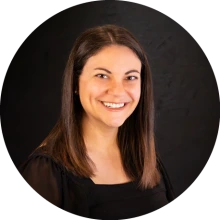
Ashley Campbell, PharmD, is an associate clinical professor in the Department of Pharmacy Practice and Science at the University of Arizona R. Ken Coit College of Pharmacy and a clinical pharmacist in geriatric medicine. She is currently serving as the Director of the Pharmacy Resident Scholars in Teaching and Learning (PRSTL) Teaching Certificate, with 27 unique pharmacy residency programs across the state of Arizona involved. Campbell earned her Doctor of Pharmacy at the University of North Carolina at Chapel Hill and completed two years of pharmacy residency training at the University of Pittsburgh Medical Center (UPMC) St. Margaret with a specialty in geriatric medicine. She also completed a two-year Faculty Development Fellowship through the University of Pittsburgh Department of Family Medicine. Her primary research areas include anticoagulation, medication safety in older adults, health span, and the scholarship of teaching and learning (SOTL). Campbell just completed her term as Chair of the AACP Geriatrics SIG and has recently stepped into the role of Immediate Past Chair.
Why did you attend the conference, and what were you looking to learn/contribute?
- I just wrapped up my term as Chair of the AACP Geriatrics SIG, so I led the SIG Networking Event. I also served as Faculty Delegate for the University of Arizona R. Ken Coit College of Pharmacy, so it was important for me to ensure that the collective voice of our faculty was heard for the proposed resolutions brought forth to the AACP House of Delegates.
Which speaker or session had the biggest impact on you and why?
- I attended a session on preparing pharmacy students to apply for postgraduate fellowships. I have already been able to apply insights from this session to student advising and feel more confident engaging with students about the various areas of industry.
Did you network with any professionals? If so, what advice did they share with you or did you share with them?
- Each year at AACP, I make it a priority to reconnect with my professors from pharmacy school and the faculty I worked with during residency. Maintaining these relationships has been invaluable as I’ve progressed through my own career. This year, one mentor reminded me that you never know what students will remember, and that perspective continues to shape how I approach my own teaching and mentorship.
What was your favorite workshop or hands-on activity, and what made it stand out?
- I am slightly biased, but I enjoyed seeing old and new faces at the Geriatrics SIG networking event.
Bernadette Cornelison, PharmD | Associate Clinical Professor

Bernadette R. Cornelison, PharmD, MS, BCPS is an associate clinical professor at the University of Arizona R. Ken Coit College of Pharmacy. Her research focuses on pharmacist care for underserved populations, ambulatory and community pharmacy practice, and the Scholarship of Teaching and Learning (SoTL). At the 2025 AACP Annual Meeting, she presented three posters on topics including learning via patient videos in self-care therapeutics, the use of chatbots for OTC medication safety in pregnancy, and faculty perceptions of diversity, equity, and inclusion at her college. She also delivered a SoTL-focused presentation during the Grant Microsessions program.
If you could bring one idea or initiative from the conference back to the College of Pharmacy, what would it be?
- Collaborative test-taking to promote peer learning, critical thinking, and deeper engagement with course material.
Did you network with any professionals? If so, what advice did they share with you or did you share with them?
- Yes, as a new CSA course coordinator, I connected with several faculty in similar roles. Their advice: remember, it’s a marathon, not a sprint.
Why did you attend the conference, and what were you looking to learn/contribute?
- I attended to share my research, learn innovative teaching strategies, and connect with colleagues to exchange ideas for improving pharmacy education.
What advice would you give others looking to attend a conference?
- Plan your schedule in advance, be open to networking, and seek out sessions that challenge and inspire your teaching or research.
Janet Cooley, PharmD | Associate Clinical Professor
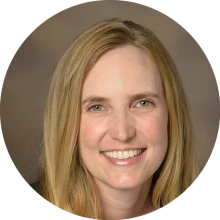
Janet Cooley, PharmD, BCACP is the Director of Experiential Education, an associate professor, and the Associate Director of Interprofessional Education at the University of Arizona R. Ken Coit College of Pharmacy. Cooley has presented over 75 times national and state level, has over 30 peer-reviewed publications on topics including precepting, experiential learning, and interprofessional education. She is the course coordinator for the Advanced Pharmacy Practice Experiences and the Preparation for Rotations course. Her scholarly interests include preceptor education, interprofessional education, professional identity formation, and the scholarship of teaching and learning.
Why did you attend the conference, and what were you looking to learn/contribute?
- I attended AACP because it is my favorite conference of the year. It is a chance for me to connect with colleagues around the country who are working on similar issues and projects. I usually leave inspired and excited by my work.
Which speaker or session had the biggest impact on you and why?
- The keynote speaker also gave the plenary address and he programming really helped influence the way I think about how we advocate for ourselves as a profession and for our patients. He really did a great job of explaining the essential nature of pharmacists and pharmacy to the healthcare system and where we fall flat in communicating that and pulling up a seat at the table. I was inspired!
If you could bring one idea or initiative from the conference back to the College of Pharmacy, what would it be?
- I have already brought back a few specific things from the conference, I am working to see how we might be able to work with our state board and NABP to improve things for our students, helping build connections between colleagues to create opportunities for students, and improve the inclusivity in our teaching.
What advice would you give others looking to attend a conference?
- I would highly recommend that you attend conferences! I always end up doing too much at conferences and go to every program and wear myself out. Make sure you make time to meet people, have conversations, build connections. Also, don’t be afraid to ask someone for their card, a connection or a next step in the conversation. Build those relationships!

